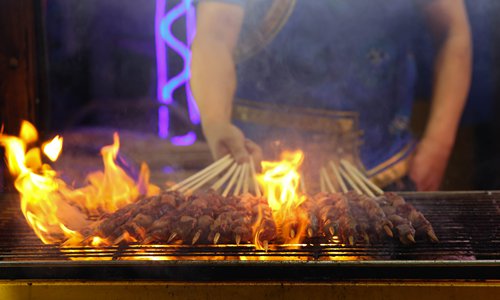After a hideous day at the office, one of the most enjoyable things to do is to head out to a Chinese kebab restaurant with friends to enjoy several skewers of the roasted meat known as chuan in Chinese. Throw in the bonus of a cold beer on a hot day and it’s easy to understand why these dishes are particularly popular in the summer.
This spicy roasted meat combined with a freshly brewed beverage creates a pleasant chill that contrasts with the outside high temperature. Foreigners who live in China for a while often frequent Chinese kebab restaurants. So what do they think about Chinese kebabs and what brought them there?
Authentic flavor
“Honestly, I didn’t like it when I first tasted it because our tastes are different from Chinese. But now I am used to it. Now it’s okay. I like it very much,” Ali, a 26-year-old student from India, told the Global Times.
Having fallen in love with the special flavor, Ali goes to the Muslim Canteen on the campus of the Beijing Language and Culture University three to five times a week with his friends to enjoy some authentic Xinjiang kebabs. The restaurant has been run for the past 18 years by a family from the Xinjiang Uyghur Autonomous Region. According to its newest manager, 23-year-old Arpat, who was born and raised in Beijing, half of the diners who come to the canteen are foreigners.
It seems that Xinjiang kebabs are particularly popular among foreigners.
“Most of the time, when I really want to eat some good meat, some good kebabs, I go to a Xinjiang restaurant,” Adam-djobo Djalilou, a 26-year-old student from Togo, told the Global Times.
Zhang Dagang, a veteran Chinese kebab industry insider, told the Global Times that Xinjiang kebabs are especially fresh, authentic and wild. According to Arpat, a special technique is used to season the meat before skewering. Eggs, onions, cumin powder and pepper powder are the secret ingredients that ensure the kebabs are tender and fresh and are not overpowered by the natural strong flavors of mutton or beef.
Although most Chinese kebabs are spicy, that is too simple of a description to capture the various flavors that exist across different regions of the country. Zhang pointed out that kebabs in Northeast China are less spicy than those found in the southern parts of China, while Beijing kebabs tend to be salty.
International clientele
Ali said that he likes the Muslim Canteen because it is clean and eating there is convenient. He also noted that the waiters and waitresses are very polite and friendly.
The Judian kebab bar is a chain that has many restaurants in Beijing and several in other cities in China and even overseas in Canada as well. According to Guo Yaqin, a Judian restaurant manager, three restaurants in Beijing are particularly popular among foreigners. The main reason being that their locations are near to where foreigners live or work.
To better meet the service needs of foreign customers, Guo learned some English to better communicate with diners.
“We put ‘BBQ’ in our restaurant sign so that foreigners will be reminded of the outdoor barbecue they had back home. We also have some balcony space so people can eat in the open air.”
Ruben Gonzalez, a 28-year-old Mexican working at ByteDance (the parent company of video app company TikTok), said that he was introduced to the Muslim Canteen by his friend who used to study at the university. He noted that a lot of his friends, some from Latin America, go there.
“It’s the food and the people around here,” Gonzalez said, explaining why he likes the canteen.
Overwhelming variety
There are some ingredients in Chinese cuisine that rarely appears in dishes in other countries. When it comes to Chinese kebabs, the range of ingredients is only limited by one’s imagination.
Akriti Nayal, a 24-year-old Indian woman, told the Global Times that she has become a fan of Chinese kebabs since moving to the country more than four years ago. Over the years, she has tasted many different varieties of kebab, her favorite now being barbecued fish tofu, which is usually served as cubes on a stick.
Djalilou said he enjoys barbecued chicken wing kebabs, a common dish at Chinese barbecue restaurants, because they come in many different flavors. Chicken hearts, feet and gizzards also often appear on the menu. Although Djalilou hasn’t worked up the courage to give chicken feet a try, he enjoys chicken hearts and gizzards for their chewy texture.
Meat is not the only ingredient on Chinese kebab menus. A lot of vegetables are delicious roasted and coated with thick sauces. According to Guo, foreign guests like tofu rolls, green peppers and enoki mushrooms very much. Like other kebab chains, Judian also changes up a part of their menu every quarter and makes use of different ingredients.
Newspaper headline: Spice of life




